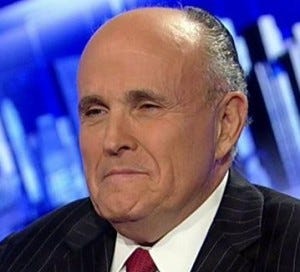
I've long been a fan of Rudy Giuliani.
The man did extraordinary work as the mayor of New York City, dramatically reducing the crime rate and ushering in an era of economic prosperity. His leadership on 9/11 (and in the months that followed) was as impressive as anything I've ever seen from an elected official.
I even did some grassroots volunteer work for his 2008 presidential campaign, because I believed (and still believe) that he would have made a great commander-in-chief.
Even in retirement from public service, Giuliani has remained a distinguished presence and powerful communicator in politics. His political endorsements have been highly sought after by candidates vying for both state and national offices (including the presidency).
In previous years, Giuliani's been more than willing to grant such endorsements – even during primary season. As we've seen with this year's cycle, however, he's chosen to take a more...let's say interesting approach in how he's allocating his political support.
Giuliani has publicly stated that he believes Donald Trump (a friend of his for 25 years) is the best candidate left in the presidential race. He says he trusts him. He says he plans to vote for him in the New York Primary, and urges others to do the same. Yet, Giuliani has also made it clear that he has not officially "endorsed" Trump.
He has tried to explain his unique stance on a number of occasions, most recently on the Kelly File last night:
"Why not endorse him?" asked host Megyn Kelly.
"Well, because I'm not part of the campaign," Giuliani answered. "I don't want anyone to think I'm an official in the campaign, I'm part of the campaign..."
Questioning the inference, Kelly made the point that – as is the case with a newspaper endorsement – voters don't assume that such a show of support requires an active commitment to the campaign. Giuliani explained that because he's a political figure, an endorsement to him means being a spokesperson. He then said that he might offer an actual endorsement, at some point, if the Trump "campaign organization" makes some of the changes he would like to see.
When Kelly pressed him, Giuliani offered a more blunt defense of his current stance, saying, "It doesn't require an obligation on my part to defend every single thing they do. Some of the things they do, like with you, like the statement about the Mexicans...the things I don't agree with."
In case you missed the emphasis I added there, the "they" Giuliani is referring to is Trump's campaign organization, and not Trump himself. That distinction, of course, makes absolutely no sense.
No one in Trump's campaign mused over Kelly's menstrual cycle, or hounded her on Twitter for the better part of a year. "Mexican rapists" wasn't a phrase some incompetent speechwriter came up with and placed on a Trump podium. These were direct products of Donald Trump's personal judgement and character, and no organizational change can alter who he is at his core.
Personally, it was hard for me to listen to such a mealy-mouthed, incoherent explanation being uttered by a man whose straight-talk I have long appreciated. Still, there's a part of me that understands Giuliani's dilemma. He wants to help out a longtime friend who's running for office.
The problem is that the office in question just happens to be the highest one in the land. It's where decisions are made that affect the entire country and even the world – decisions for which Giuliani most certainly knows Trump is grossly ill-equipped to make.
It's one thing for a man like Giuliani to muster up friendly moral support through rhetorical tightrope-walking and even some behind-the-scenes advising. It's another to lend out a hard-earned reputation to someone who spends more time thinking of nicknames for his opponents than he does Middle Eastern conflicts.
Giuliani became a household name for his leadership on 9/11. The experience earned him a good amount of political capital, which he then used to help President George W. Bush get re-elected on a "War on Terror" platform.
Trump, on the other hand, has found it politically beneficial to actually blame Bush for 9/11, and has entertained Truther conspiracy theories on the attacks.
On the Iraq War, Giuliani was a strong proponent of the effort and the removal of Saddam Hussein.
Conversely, Trump likes to echo the same "Bush lied, people died" anti-war sentiment that was being pushed years ago by the likes of Michael Moore and Code Pink. These same people branded Giuliani a war-monger for making his voice heard on Iraq (when they weren't busy portraying him as Bin Laden's 9/11 accomplice), and now Trump is using their old talking points.
When Giuliani dropped out of the presidential race in 2008, he became perhaps Senator John McCain's most effective ally, touting the former POW's unrelenting patriotism and war-time sacrifice at every opportunity.
Last year, Trump dismissed the notion that McCain was a war hero, and even went as far as to mock American POWs for their capture.
The former mayor of New York recognizes that a full-throated Trump endorsement is a potential stain on his legacy. And if he wasn't already sure of this months ago, all he had to do was look at the caricature Chris Christie was reduced to, after the New Jersey governor compromised his principles and integrity, and allowed himself to be used as a Trump prop.
Giuliani certainly doesn't want that to happen to him. He's worked too hard to establish himself as an important historical figure.
But to support his friend, he'll likely keep up the plausible-deniability song and dance as long as he can, and hope that he can come out of it without demeaning his own stature.
We'll see if he can pull it off.











